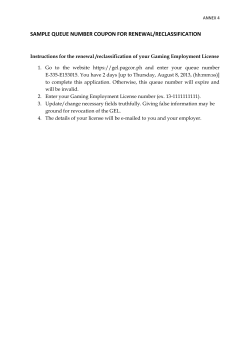
Portfolio Media. Inc. | 860 Broadway, 6th Floor | New...
Portfolio Media. Inc. | 860 Broadway, 6th Floor | New York, NY 10003 | www.law360.com Phone: +1 646 783 7100 | Fax: +1 646 783 7161 | customerservice@law360.com New Jurisdictional Issues When Moving To Quash A Subpoena Law360, New York (October 22, 2014, 10:35 AM ET) -Recent revisions to Federal Rule of Civil Procedure 45 created new jurisdictional issues that litigators should be aware of when considering the proper jurisdiction in which to file a motion to quash a civil subpoena. Rule 45 empowers a party in federal civil litigation to command a nonparty to attend a deposition and to produce documents. Complying with a civil subpoena can be an enormously burdensome undertaking for any nonparty. Subpoenas may also target information that a nonparty considers highly confidential. Accordingly, a threshold question any subpoena recipient faces is whether to move to quash the subpoena. In a recent decision by the United States District Court for the District of Nevada, Magistrate Judge Nancy J. Koppe tackled several important jurisdictional issues to consider when moving to quash a civil subpoena under the recently enacted changes to Rule 45. Steven Luxton In Agincourt Gaming LLC v. Zynga Inc., No. 2:14-cv-0708-RFB-NJK, (D. Nev. Aug. 15, 2014), the court addressed a motion to quash subpoenas filed by five non-party respondents and the defendant’s counter-motion to dismiss, transfer, or compel. Less than two months after the newly enacted version of Rule 45 went into effect, the defendant in an ongoing patent infringement lawsuit served subpoenas on a nonparty gaming company that designs, manufactures, distributes and operates gaming devices and four nonparty individual respondents. The underlying patent lawsuit was pending in the District of Delaware, the nonparty gaming company was located in the District of Nevada, and the individual nonparty respondents were located in the Northern District of California. In accordance with Rule 45, the Delaware action subpoena required the nonparty gaming company to produce documents in Nevada while the individual respondent subpoenas required compliance in California. Despite the three jurisdictions at play, the gaming company and the individual respondents joined together and initiated a single proceeding in the District of Nevada and filed a joint motion to quash in that court. The nonparties asserted standard reasons for quashing a subpoena, including breadth, relevance, burden and protection of confidential information. The first important procedural question before the court was which version of Rule 45 applied to the dispute. The court began by explaining that the 2013 amendments made significant changes to Rule 45, which went into effect on Dec. 1, 2013. The court further noted that “the Supreme Court specified the amendments would govern in all proceedings commenced after Dec. 1, 2013, and, insofar as just and practicable, all proceedings then pending.” While recognizing that the underlying Delaware action was commenced before Dec. 1, 2013, the court nonetheless held that, because the subpoena-related dispute did not commence until May 2014, it was proper to apply the current version of Rule 45. The court next turned to the subpoenas served on the individual California respondents. Under the previous version of Rule 45, the court that issued the subpoena — the “issuing court” — possessed jurisdiction to quash or modify a subpoena. In this case, the “issuing court” was the District of Delaware. Under the current version of the rule, however, the court for the district where compliance is required — the “compliance court” — has jurisdiction. The court therefore declared that, under the current version of Rule 45, "when a motion to quash a subpoena is filed in a court other than the court where compliance is required, that court lacks jurisdiction to resolve the motion.” Because the individual respondents lived and/or worked in the Northern District of California, the subpoenas required compliance within 100 miles of where the persons resided in that District. Nonetheless, the individual respondents raised a novel argument as to why a filing in the District of Nevada was proper. Because they did not possess any of the documents sought, and the responsive documents were actually in the possession of their Nevada-based employer, the individual respondents argued that the District of Nevada by extension was their place of compliance. In response, the court asserted that the plain text of Rule 45 mandates that the place of compliance is linked to the subpoenaed person’s location. In particular, Rule 45(c)(2)(A) declares in no uncertain terms that the place of compliance must be “within 100 miles of where the person resides, is employed, or regularly transacts business in person.” The court further explained that Rule 45 “does not provide an alternative basis for the Court to find that the place of compliance is not tethered to the subpoenaed person’s location, but rather could be found to be some other district where the subpoenaed person contends the responsive documents are located or where the subpoenaed party with possession of the documents is required to comply.” Therefore, because the individual respondents failed to provide any justification for the “novel proposition” that they were free to file their motion to quash in a district where compliance was not required, the court found that it lacked jurisdiction to rule on the individual respondents’ subpoenarelated motion and transferred the subpoena-related motions, to the extent that they related to the individual respondents, to the Northern District of California. Under newly enacted Rule 45(f), there was no question that the motion to quash was properly filed in the District of Nevada as it pertained to the gaming company given its location in the district. Nonetheless, the defendant sought to transfer the motion to the District of Delaware. In ruling on the transfer request, the court explained that before the 2013 amendments, the court for the district where compliance is required issued subpoenas for document productions or depositions. Under the new version of Rule 45(a)(2), however, the subpoena must be issued from the court where the action is pending. And while the new rule provides the court where compliance is required with the power to adjudicate a motion to quash, as discussed above, the new rule also allows for transfers of such motions to the issuing court “[w]hen the court where compliance is required did not issue the subpoena, it may transfer a motion under this rule to the issuing court if the person subject to the subpoena consents or if the court finds exceptional circumstances.” The court clarified that although the advisory committee notes do not list all circumstances justifying transfer under Rule 45(f), they do establish a “balancing test” for the court to consider. That is, the court should weigh the circumstances favoring transfer against “the interest of the nonparty served with the subpoena in obtaining local resolution of the motion.” Put another way, the court must weigh “the burden on the party responding to the subpoena in the event of a transfer” against “factors such as judicial economy, docket management, and the risk of inconsistent rulings.” After weighing the factors, the court found that transfer of the motion to quash to the District of Delaware was appropriate. In terms of judicial economy, the court held that the issuing court possessed “superior familiarity” with the dispute, having handled similar discovery disputes in the underlying litigation and being well versed with the plaintiff’s patent infringement claims. Moreover, given the overlapping discovery issues already briefed in the two courts, the possibility of inconsistent rulings existed. Finally, the court found the gaming company’s “burden” arguments unpersuasive, given that it failed to identify “any meaningful burden that it would face by transferring the subpoena-related motion to the District of Delaware.” As a result, the court transferred the gaming company’s motion to quash to the issuing court under the newly enacted Rule 45(f). The court’s decision in Agincourt Gaming, LLC is an important reminder that a nonparty wanting to challenge a subpoena should consider carefully the appropriate jurisdiction in which to file a motion to quash under recently enacted Rule 45. As the court noted, however, “a robust body of law has not yet developed within the ... Circuit[s] addressing the issues applicable here,” and will likely evolve as new and novel arguments are asserted. —By Steven A. Luxton and W. Brad Nes, Morgan Lewis & Bockius LLP Steven Luxton is a partner and Brad Nes is an associate in Morgan Lewis' litigation practice group, resident in the firm's Washington, D.C. Office. The opinions expressed are those of the author(s) and do not necessarily reflect the views of the firm, its clients, or Portfolio Media Inc., or any of its or their respective affiliates. This article is for general information purposes and is not intended to be and should not be taken as legal advice. All Content © 2003-2014, Portfolio Media, Inc.
© Copyright 2025













